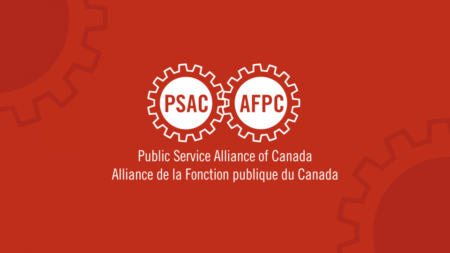Against the backdrop of a nationwide strike vote for over 9,000 members in the FB group, our bargaining team rejected concessions put forward by representatives from Treasury Board and Canada Border Services Agency (CBSA) during Public Interest Commission (PIC) hearings April 22.
PSAC-CIU presented our arguments to reach a fair contract for FB members during PIC hearings April 10. FB members deserve fair wages that are aligned with other law enforcement agencies across the country, telework for non-uniformed personnel, better rights around discipline, technological change, hours of work, and equitable retirement.
Employer concessions would roll back gains for members
During the hearing, the employer argued that “compensation levels for the FB group are adequate” based on their ability to “attract and retain a substantial FB workforce.” However, this shows willful ignorance on their part because staffing shortages have created ripple effects throughout the agency as CBSA tries to fill the gaps by denying leave for workers and using untrained workers and machines to replace our members’ work.
The employer also stated that it is inappropriate to compare members of the FB bargaining unit – including Hearings, Programs, Trade, Inland Enforcement, Investigations, Intelligence and Border Services Officers – with other large law enforcement organizations such as municipal, provincial, and federal police forces. This argument doesn’t hold water considering CBSA is Canada’s second largest law enforcement agency.
Toxic workplace culture at CBSA
Treasury Board and CBSA representatives also argued that excessive discipline and management heavy-handedness is not a problem at CBSA. However, this flies in the face of what PSAC and CIU members see and hear in the workplace every day and what has been repeatedly reported in Public Service Employee Surveys. Senior management is completely out of touch with the work we do day in and day out and the toxic workplace culture at CBSA.
The employer also held on to proposed collective agreement changes that would gut our right to negotiate variable shift scheduling agreements, give managers the ability to change shift change notice from seven days to 48 hours, and add restrictions to leave without pay for the care of family.
We have worked to keep Canada’s borders secure, and we deserve to be treated with respect.
- Download the full Treasury Board PIC brief
- Read the full PSAC PIC brief
Next steps
In the coming weeks, the PIC board will provide a non-binding recommendation to reach an agreement based on the hearings. While federal legislation provides for the PIC to issue its recommendation within 30 days of the hearing, the chair may extend that timeline.
Strike vote and mobilization continue
PSAC and CIU continue to hold a nationwide strike vote for the FB group April 10 to May 15, ramping up the pressure on CBSA in advance of the release of the PIC report. FB members will be in a legal strike position seven days after the release of the PIC report.
- Strike vote information.
- Take the mobilisation survey and sign up to take action.
- Support your bargaining team by using these graphics.
Be sure to keep your contact information up to date to receive all the latest updates. If you have any questions, please contact your Customs and Immigration Union branch president or visit the CIU and PSAC websites.
This article was first posted on the PSAC website.





